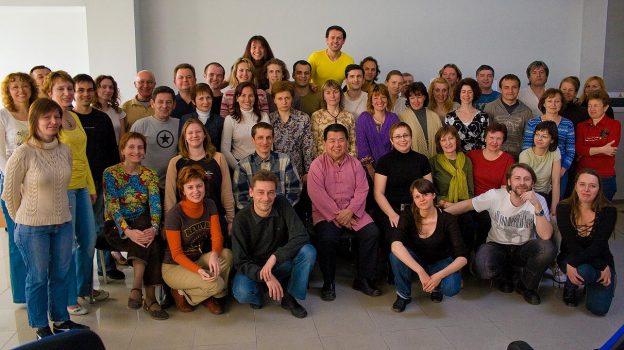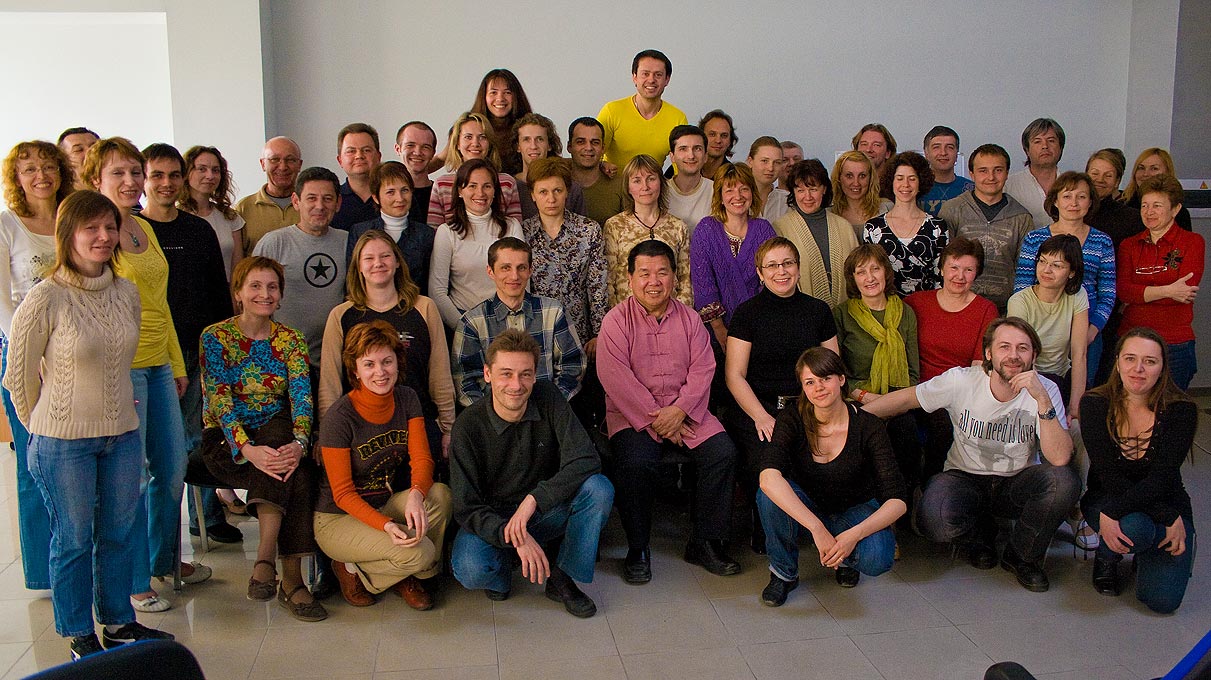This interview was conducted in April 2010 in Kyiv, Ukraine, by Toma Ruzhanska — then Chief Editor of the Ukrainian magazine Zefir — and Taras Lytvyn, who at the time was a writing editor for the same publication. At that period, Toma Ruzhanska was organizing Dr. Hsu’s workshops and consultations in Ukraine, while Taras Lytvyn served as his interpreter and translator.
1. Why do you think only a few Eastern traditions of harmonizing life and living spaces (the most prominent and well-known being the Chinese tradition of Feng Shui) have survived to this day, while Western architects have lost this natural knowledge?
In terms of design principles, there is no difference between East and West. People in different parts of the world have long positioned their homes in similar ways, following a universal approach which the Chinese expressed in the phrase: “Rest against a mountain and face open space.” Both Eastern and Western people relied on their own intuition to decide how best to build a home.
The difference is that in China, thanks to a long and continuous flow of history, all the accumulated knowledge was organized and recorded. However, the concept of qi is not as clear or obvious in the West. Traditionally, the Chinese have shown more respect for nature and have identified the concept of qi — the life force present in each of us and in everything that surrounds us.
In Feng Shui, a building is not only a physical object, but also an energetic body and a carrier of information. In the modern West, as well as in the modern East, people tend to think of a house simply as a physical object. Another difference: in the West, people worship God; in China, people worship Nature.
________________________________________
2. What is Feng Shui made up of?
Feng Shui has two pillars. First, the application of the Yin–Yang theory in any design to find balance in the combination of elements. Second, qi energy — an essential aspect in working with any living space. This energy can be studied by analyzing the form of any object.
________________________________________
3. The Chinese tradition classifies countless things, with all kinds of properties, into only two types: Yin and Yang. Why?
The concepts of Yin and Yang came from observing everything that happens in the universe. It’s important to understand that Yin and Yang are not fixed, unchanging entities. They are symbols used to describe any things or processes. This is the simplest model through which one can describe and analyze everything that happens in nature.
________________________________________
4. But there’s also grey between black and white! Between joy and sadness there are other emotional states. How does that fit into the Yin–Yang theory?
Yin and Yang are merely tools, symbols. In reality, there is nothing in nature that can be called Yin and nothing that can be called Yang. These terms appear only as symbols when comparing two things with each other. They are used to describe duality.
________________________________________
5. Is the interaction between Yin and Yang important? How does it manifest, and what does it influence?
The more manifest, active aspect is Yang, while the less manifest is Yin. In a day, for example, daytime is Yang, nighttime is Yin. Among people, men are Yang (they are stronger, larger, more dynamic), and women are Yin. In emotions, joy is Yang and sadness is Yin. This is the basic model.
How do we apply it in life? Each object or process should be seen as a separate universe. In China, there is a term for this — Taiji — meaning a complete universe made up of Yin and Yang aspects.
For example, a house and its residents as a whole form a Taiji. Within this whole there are two components: the static — the house, which is Yin — and the dynamic — the people, which are Yang. For a harmonious life, these Yin and Yang aspects must be balanced. A couple living in a huge house, or a large family in a tiny space, is an imbalance of Yin and Yang. These need to be brought into balance.
________________________________________
6. Can Yin and Yang switch places depending on the circumstances? What is this related to?
Everything in the universe is in constant change. Yin and Yang constantly flow into and transform into each other. Day turns into night, and night into day. Births and deaths follow one another. Any success, sooner or later, reaches its peak and then transforms into its opposite — and vice versa.
________________________________________
7. Do you think this is wisdom, or an attempt to explain circumstances?
Wisdom is true knowledge — knowledge of how everything happens. The concept of Yin–Yang describes how everything occurs in nature. Therefore, we can say it is wisdom.
________________________________________
8. Can wisdom be divided into Yin and Yang?
Everything in nature can be considered a Taiji, including wisdom. Wisdom is a Taiji, not Yin or Yang by itself. But if we compare wisdom with ignorance, then wisdom is Yang and ignorance is Yin.
________________________________________
9. Is there such a thing as feminine wisdom and masculine wisdom?
I’ve already answered that question.
________________________________________
10. How is the Earth divided into Yin and Yang?
It depends on the perspective. If we talk about the Earth as a planet, then all living beings on Earth are Yang, and all inanimate objects are Yin. If Yang on the planet becomes too abundant (for example, overpopulation), the Yin–Yang balance is disrupted, and people begin to experience problems.
________________________________________
11. What is energy?
There is physical energy, which we all know — heat, light. In Feng Shui, we are more interested in life energy, qi. Qi is the most subtle, fundamental element from which the entire universe is made.
________________________________________
12. How is energy divided into Yin and Yang?
Energy is a Taiji — a complete universe in itself.
________________________________________
13. In a human being, what is Yin and what is Yang?
Again, it depends on the perspective. One could say that the physical body is Yang, while the mental and spiritual body is Yin. Or that the outer part of a person is Yang, while the inner part is Yin.
________________________________________
14. What does knowing about Yin and Yang give us? Why should we care, for example, about what is Yin and what is Yang when we eat with a knife and fork?
The Yin–Yang theory is a powerful tool for understanding everything that happens. It helps us deeply grasp the essence of phenomena and live in harmony with nature.
Whether we like it or not, we directly depend on nature and its manifestations. Nature governs us. Why do we turn a light switch to the right, clockwise? Why do we increase volume or temperature by turning a dial from left to right? All this is determined by the forces of nature — these are not random things.
Why is it that in sports arenas all over the world — cycling, motorcycle racing, car racing, horse racing, running tracks — movement has always gone counterclockwise? This too is determined by the natural forces of the world. The Yin–Yang theory explains why this happens. Even the way we use a knife and fork can be explained in terms of Yin and Yang.
________________________________________
15. Zodiac constellations are usually associated with the four natural elements: fire, water, air, and earth. How do they relate to Yin and Yang?
All these four elements are Taiji. The universe itself is a Taiji, and within it you can identify Yin and Yang aspects depending on what you compare. When water is calm and flows gently, it is Yin; when it boils or flows rapidly, it is Yang.
________________________________________
16. Is harmony the same as happiness?
Happiness is a state of mind. Harmony is a state of balanced being. In the literal sense they are not the same, but balance can lead to happiness.
________________________________________
17. Is Feng Shui alone enough to achieve harmony and happiness? If not, what else is needed?
The knowledge of Feng Shui helps people live in balance, harmonizing Yin and Yang. Life is dynamic — everything in it is constantly changing — and a person needs to be constantly in tune with the situation. The laws of nature (such as the Yin–Yang theory) are higher-order laws, so if a person follows them, everything else of lower order tends to align.
________________________________________
18. What is the purpose of human life? What is your purpose?
To become a better person when leaving this world than I was when I came into it.
________________________________________
19. What is creativity? We often say that humans can create entirely new things that never existed in nature. Do you agree?
We do not create things — we discover things that already exist. We may say we invented airplanes, but we did not invent the mechanism of flight. Can we create time? Space? We cannot. We cannot create what does not exist. All modern gadgets, devices, electronics, sensors — they have long existed in our brains.
________________________________________
20. Your favorite food or dish? And what do Chinese people generally like most?
Vegetables, rice, tea, nuts.
________________________________________
21. Do many people in modern China practice Feng Shui?
True Feng Shui knowledge has never been popular in China — neither in the past nor now. There are many popular folk practices that are called Feng Shui. When a person follows their intuition in building and designing a home, and in life in general, they are naturally and automatically applying true Feng Shui.
________________________________________
22. What is most important in life for Chinese people, and how is this different from Westerners?
For all people, regardless of origin, the most important thing is to live well.
________________________________________
23. Name three most important things people should do to be happy and live in harmony.
First — have food, clothing, and a roof over one’s head.
Second — have an energetic connection with living beings, meaning love others and yourself.
Third — have wisdom.
________________________________________
24. Are you happy and harmonious? Thanks to what?
Happiness and a harmonious life are relative concepts. Based on what I’ve experienced in life, someone might say I deserve more. But I feel completely content — thanks to all the people and things in my life.
________________________________________
25. If you had a chance to address ALL the people on Earth at once, for example through satellite television, what would you say to them?
I would simply smile at them and thank them for the opportunity to be connected with everyone, feeling myself as one with them.
To the questions of Toma Ruzhanska and Taras Lytvyn answered Feng Shui Master Shan-Tung Hsu.


